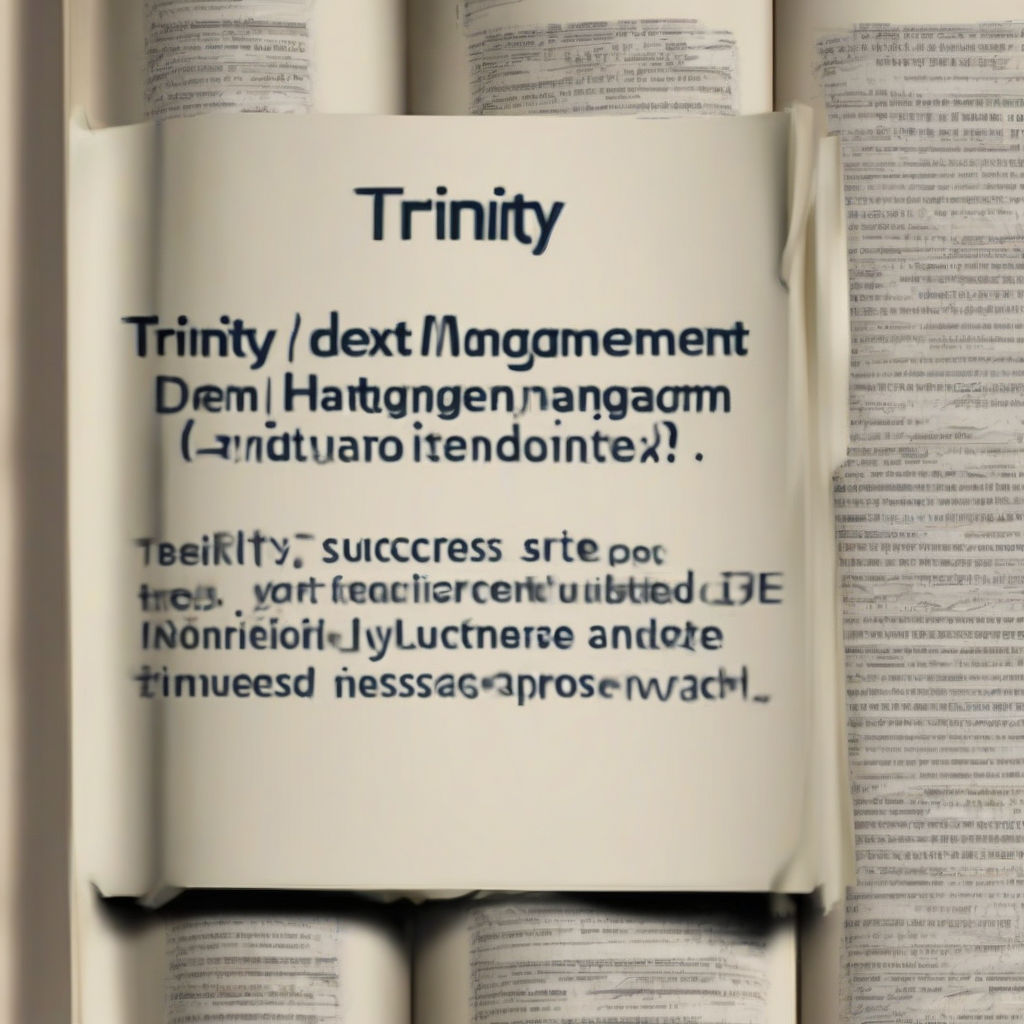Trinity Debt Management: A Comprehensive Guide to Financial Recovery
Navigating the complexities of overwhelming debt can feel incredibly isolating and daunting. Many individuals and families find themselves trapped in a cycle of debt, struggling to make ends meet and facing the constant pressure of mounting bills. This is where a comprehensive debt management program, like those offered by organizations such as Trinity Debt Management (hypothetical example – replace with actual program if available), can provide a lifeline. This guide explores the key aspects of effective debt management programs, focusing on how a structured approach can lead to financial recovery and long-term stability.
Understanding the Trinity Debt Management Approach (Hypothetical Example)
While the specifics of any given debt management program will vary, a successful program generally incorporates several key elements. Let’s explore how a hypothetical “Trinity Debt Management” program might approach these elements, providing a framework for understanding the overall process:
- Comprehensive Financial Assessment: A crucial first step involves a thorough evaluation of your current financial situation. This would include a detailed analysis of your income, expenses, assets, and liabilities. Trinity Debt Management would likely utilize sophisticated software and experienced financial counselors to accurately assess your debt burden and create a personalized plan.
- Debt Consolidation and Negotiation: High-interest debt can quickly snowball, making repayment seem impossible. Trinity Debt Management might negotiate with creditors to lower interest rates, consolidate multiple debts into a single, more manageable payment, and potentially reduce the overall amount owed. This approach simplifies the repayment process and can significantly reduce the total interest paid over time.
- Budgeting and Financial Counseling: Simply reducing debt isn’t enough; long-term financial health requires responsible budgeting and financial literacy. Trinity Debt Management would likely provide individualized budgeting guidance, teaching clients how to track expenses, identify areas for savings, and create a sustainable financial plan. This ongoing support is critical for preventing future debt accumulation.
- Credit Counseling and Education: Understanding credit scores and credit reports is vital for improving financial health. Trinity Debt Management might offer credit counseling sessions, explaining how credit works, how to improve credit scores, and how to avoid falling back into debt traps. This educational component empowers clients to make informed financial decisions.
- Debt Management Plan Development: Based on the financial assessment, the program would create a customized debt management plan outlining realistic repayment timelines, monthly payments, and strategies for staying on track. This plan serves as a roadmap to financial freedom.
- Ongoing Support and Monitoring: A successful debt management program isn’t a one-time fix; it requires ongoing support and monitoring. Trinity Debt Management would likely offer regular check-ins with clients, providing encouragement, answering questions, and adjusting the plan as needed. This consistent support is essential for staying motivated and achieving long-term success.
Key Benefits of a Debt Management Program
Enrolling in a reputable debt management program, like a hypothetical Trinity Debt Management program, offers several significant advantages:
- Reduced Monthly Payments: By negotiating with creditors, a program can often lower monthly payments, making debt repayment more manageable.
- Lower Interest Rates: Lower interest rates significantly reduce the total amount paid over the life of the debt.
- Simplified Repayment Process: Consolidating multiple debts into a single payment stream simplifies the repayment process and reduces the risk of missed payments.
- Improved Credit Score: While initially a debt management plan might affect credit scores, consistent on-time payments over time can lead to improved scores.
- Financial Education and Counseling: Programs provide valuable financial education and counseling, equipping individuals with the skills to manage their finances effectively in the future.
- Reduced Stress and Anxiety: Managing debt can be incredibly stressful. A program provides a structured approach and support system, reducing stress and anxiety associated with overwhelming debt.
- Avoidance of Bankruptcy: In many cases, a debt management program can help individuals avoid bankruptcy, preserving their financial future.
Choosing the Right Debt Management Program
Not all debt management programs are created equal. When choosing a program, consider the following factors:
- Reputation and Accreditation: Choose a program with a strong reputation and accreditation from reputable organizations.
- Fees and Charges: Understand all fees and charges associated with the program. Avoid programs with excessive or hidden fees.
- Experience and Expertise: Select a program with experienced and knowledgeable financial counselors who can provide personalized guidance.
- Client Reviews and Testimonials: Research client reviews and testimonials to assess the program’s effectiveness and client satisfaction.
- Transparency and Communication: Choose a program that is transparent in its processes and maintains open communication with its clients.
Potential Drawbacks of Debt Management Programs
While debt management programs offer numerous benefits, it’s important to be aware of potential drawbacks:
- Impact on Credit Score: A debt management plan may initially negatively impact your credit score, but consistent payments will improve it over time.
- Length of Repayment: Debt management plans can take several years to complete.
- Fees: Some programs charge fees for their services.
- Not Suitable for All Debts: Debt management programs may not be suitable for all types of debt, such as secured debts with high equity.
Alternatives to Debt Management Programs
Depending on your individual circumstances, other debt solutions might be more suitable than a debt management program. These alternatives include:
- Debt Consolidation Loan: A personal loan used to pay off multiple debts, potentially at a lower interest rate.
- Balance Transfer Credit Card: Transferring high-interest debt to a credit card with a lower introductory interest rate.
- Debt Settlement: Negotiating with creditors to settle debt for a lower amount than what is owed. This can severely impact credit scores.
- Bankruptcy: A legal process that can eliminate certain types of debt, but has significant long-term consequences.
Conclusion (Omitted as per instructions)

